

























































Protesters attended a “Hands Off” rally in Washington, DC on April 5 to protest against the Donald Trump administration’s policies and Elon Musk’s Department of Government Efficiency. Credit: Getty Images
Black people stayed home, Why?
You all must have seen videos and photographs from the nationwide “Hands of!” mass-action protests at state capitols, federal establishments, city halls and congressional ofces.
People around the world took to the streets to voice their concerns about President Donald Trump and his senior advisor Elon Musk’s policies, and demanded “an end to this billionaire power grab.”

But did you notice something else? Did you find a large number of Black protesters? Scrolling through hundreds of social media posts, I did not.
Googling the absence of Black protesters on April 5, I fnally found an answer.
You must be wondering why. Popular TikTok personality Ashley Te Baroness explained when Black people protest, they are targeted.
“Tis administration…they’ve let us know in no uncertain terms Black people in the street equals threat. Tey’re looking for a reason to vilify us,” she said in a video. “Tey’re waiting for a headline to twist. Tey’re hoping for a camera angle that’s going to justify their brutality…we’re not marching this time, we’re not going to give them the photo op that they so desperately want.”
Black people were asked to stay indoors to protect themselves. Tey were also reminded that about nine in 10 Black female voters supported Harris in 2024. So, while protesters posted photos of their marches, Black Americans went to the spa, organized cookouts, or binged on old Martin videos. In myriad ways, they said, “We will sit this one out.”
The Houston Community College’s Communications Director, Donald Sparks, invited me to a press meeting on their campus. As an education reporter who has always wondered about courses that prepare students for career choices other than medicine, engineering and teaching, I was happy to see HCC offering a diverse array of non-traditional curricula for students. These include fashion and interior design, solar installer certification, culinary arts,
construction management, barber/stylist, cosmetology and HVAC programs.
Located on several HCC campuses throughout the city, these programs can also address Texas’ high demand for skilled workers in construction, mechanics and agriculture. Ongoing infrastructure projects, residential/commercial developments and rebuilding efforts drive the need for a skilled workforce. Additionally, certificate programs are typically cheaper than college.
Another notable initiative is the Community Learning Program, which offers free workshops and learning series for youth, adults and seniors aged 50 and above.
At times, a lack of awareness about these programs can prevent students from pursuing alternate careers. But, these courses can also be useful in equipping students with specialized skills that employers may be looking for.
Have you been following the “Black Smithsonian” debate? President Trump recently signed an executive order accusing the Smithsonian—specifcally the National Museum of African American History and Culture—of pushing a “divisive, race-centered ideology.” While Trump calls it a move to “restore truth” to American history, critics say it is more about the erasure of Black history, wiping out the very foundation of this country sustained by Black labor.
Te order says the National Museum of African American History and Culture is pushing a “divisive, race-centered ideology.”
Historians, civil rights leaders and Black lawmakers are sounding the alarm. Tey argue that the Founding Fathers enshrined slavery in the U.S. Constitution and declared enslaved people to be “three-ffhs of a person.” Tey added one cannot talk about the nation’s story without talking about racism and resistance.
• Gov. Greg Abbott fnally sets special election date.
• Te Black Press is needed now more than ever.
• Recap of UH’s good run in the Final Four.
By Tannistha Sinha
Overtime cost were one of the frst issues of contention as city officials kicked off Houston’s budget discussions.
City Controller Chris Hollins is urging Houston’s leadership to address runaway spending, especially in the police, fire and solid waste department. Mayor John Whitmire, meanwhile, contends Hollins does not consider all funding sources. Tension has been boiling over as city ofcials confront a projected $330 million budget shortfall and ballooning overtime costs.
Te controller’s report revealed the city budgeted $65 million but is projected to spend $137 million in overtime.
“Equally troubling is the fact that, historically, departments have relied on vacancy savings from unflled positions to ofset the excess,” Hollins said. “Plugging the gap with that same approach will be increasingly difcult.”
Whitmire’s administration, however, projects an overtime spending of $148.8 million, considering all funding sources.
Deputy Controller Will Jones also noted that solid waste, fire and police departments are projected to exceed their overtime budgets by 75%, 95%, and 190% and are on track to reach all-time highs.
Solid waste is over budget in both disposal and temporary personnel services and HPD is facing ongoing uncertainty related to federal reimbursement for disaster-related overtime and “persistent challenges in fghting violent crime,” according to Hollins.
Additionally, federal aid from the
By Aswad Walker
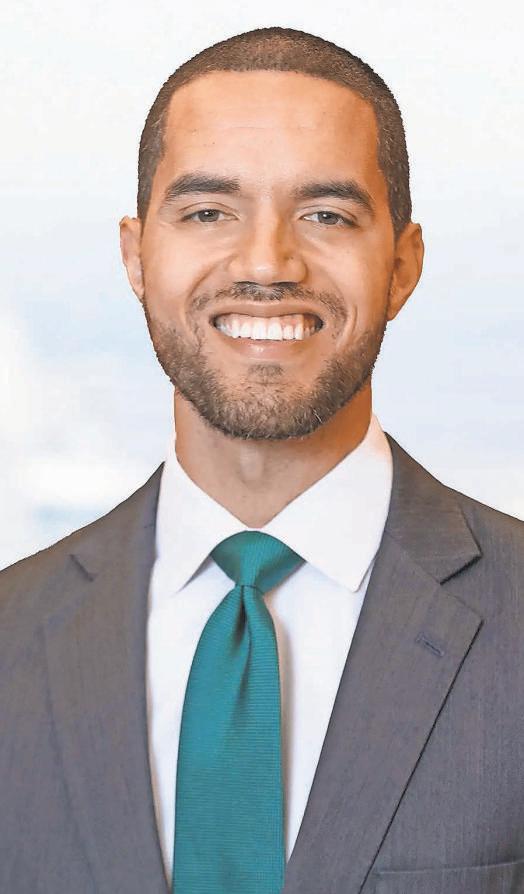
American Rescue Plan Act (ARPA) and the CARES Act, once critical sources of overtime funding, has dried up. Hollins argued that despite knowing these “one-time funding sources were no longer gonna exist,” city leaders budgeted less for overtime in the last budget passed in June 2024.
Whitmire disagrees
Pushing back against the controller’s report, Whitmire attributed the issue to a continuation of long-standing challenges
Carstell Artensa Walker, Jr, was born the second of fve children to his parents, Carstel Artensa Walker, Sr., and Priscilla Bell Stinson-Walker, on the morning of March 1, 1938 in Cincinnati, Ohio. He died on March 31, 2025.
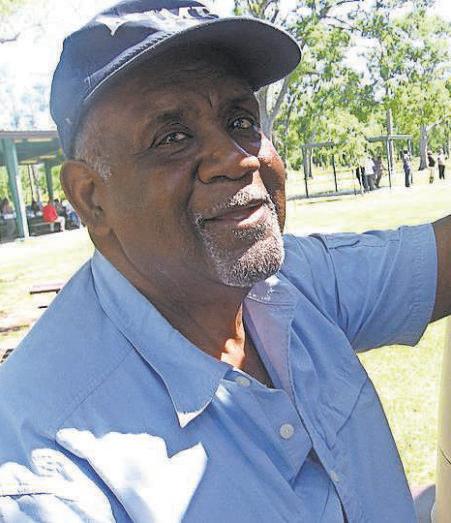

rather than a new fscal crisis. Whitmire accused Hollins of excluding other sources of overtime funding and failed to give context, pointing to emergency responses, weekend police surges, and two recent storms as unavoidable drivers of overtime.
“A political report is not acceptable in March of 2025,” Whitmire said. “It’s just so essential that we use complete information and not use scare tactics, because in previous years, there was not the transparency that we’re currently displaying today.”
Services for Walker will be held on Friday, April 11 at his beloved Blueridge Methodist Church (2929 Reed Rd., Houston, 77051), with the viewing at 10 a.am. and service at 11 a.m.
Walker graduated from Cincinnati’s historic Withrow High School (1956) where he was a star baseball player and starting running back on the school’s 1955 High School Championship football team. Walker also participated in basketball, swimming, boxing, distance running, and bowling. He later added tennis and golf to his athletic resume.
Walker, a Boy Scout, accepted Christ as a teenager at St. Mark’s Methodist Episcopal Church where he sang in various choirs from youth to adulthood.
Walker passed on a football scholarship ofer from Kentucky State University,
choosing rather to join the U.S. Marine Corps. to prevent being drafed later. Afer serving, Walker took classes at the University of Cincinnati and Ohio State University.
In mid-July 1959, he met his wife-to-be, Norma Jean Hill, while she was a basketball cheerleader at Miami University in Oxford, Ohio. Te late Rev. Fred Shuttlesworth married them on July 14, 1962, at Revelation Baptist Church in Cincinnati.
Walker had an extensive and stellar working career, including stints at the Fisher Body Division of General Motors, Southwestern Bell, AT&T, Cobb Fendley and United Parcel Service, from which he received a promotion and transfers from Cincinnati to Columbus, Ohio, New Orleans, and eventually Houston (1974).
His family joined Blueridge United Methodist Church in May 1975. There, Walker served in countless capacities,
Finance Director Melissa Dubowski said that general fund spending on overtime has increased but when considering total spending that includes federal funds and special revenue funds, spending on overtime is not drastically higher than in previous years. She added that the city will bring in $50 million of recurring revenue from METRO to ofset the expenditures absorbed by the general fund.
“It’s misleading to paint a picture that the amount of overtime that’s happening has increased drastically from prior years. It’s just the funding source is different,” Dubowski explained.
Challenging the assertions presented in the fnancial report, Councilmember Edward Pollard said the city’s financial practices do not refect its funding.
“It seems as if we’re spending way more than what we’re bringing in and we’re going in the wrong direction when it comes to our city fnances,” Pollard said.
So, what now?
To address the growing overtime burden, Hollins’ ofce plans targeted audits across both civilian and uniformed departments, which he said will determine whether overtime is being used appropriately, internal controls are functioning and waste or ineffciencies are driving costs. Per his report, the total overage for solid waste is projected to be $3 million, $26 million for HPD and “north of” $42 million for HFD.
Te audit will span four years and include a review of back pay to ensure compliance and accountability, Hollins explained.
including membership in multiple choirs, United Methodist Men, Boy Scout Committee, Trustee Chairman and 18 ½ years as Council on Ministries Chairman. Walker was also active with Windsor Little League Baseball, Westbury Steers Football and the Willowridge High School Athletic Booster Club
He was also a proud delegate at multiple state Democratic Conventions.
Walker, who was also an artist, writer and photographer, is survived by his son Alan “Aswad” Walker (Adrianne), daughter Pamela Walker (Ezra Thomas III), grandchildren MarQuita Elam, Biko Walker, Bria Fuller (Joe Campher), Maisha Walker, Anana Walker, Marshall Reynolds, Amari Walker and Matthew Simpson, great-grandchildren Noah Elam, Tori Elam, Sarai Martin, Zoeigh Elam and Mars Campher, and a host of other family and friends.
By Tannistha Sinha
Making educational opportunities available to underserved children and protecting communities from health risks keep State Rep. Senfronia Thompson (D-Houston) up at night even 50 years later. As the longest-serving woman and Black lawmaker in the Texas Legislature’s history, the Houston attorney now serving her 21st term in office still remains steadfast in her advocacy for the state’s legal system, health equity and civil rights. Since entering the House when Barbara Jordan was one of the only other Black women in Texas politics, Thompson has written and passed hundreds of bills that fundamentally altered the lives of working-class Texans—from securing 12-month postpartum coverage for mothers, to mandating HPV screenings and 3D mammograms.
own experiences in the classroom, Thompson observed the effects of trauma and poverty on learning.
Their lived realities rarely factor into education policy, but must.
“We cannot resolve some of the issues that the students come to school with,” Thompson stated. “It is easier to build a child than to repair an adult.”
enforcement
Advocating for a pretrial hearing to determine if a defendant has intellectual disabilities, which would exempt them from execution, Thompson argues that such hearings would cost $200,000 instead of $2 million in death penalty trials. Although the bill passed the Texas House, it repeatedly died in the Senate—possibly due to partisan politics.
Thompson also spoke for parole reform to expand the restoration of civil rights to for
(HB 31, HB 624).
Her legislation also includes protection for individuals under duress or coercion (HB 372, HB 2772), limiting arrest for fine-only misdemeanors (HB 656), restrictions on police conduct (HB 888: duty to render aid, HB 896: neck restraint ban, HB 902: peace officers’ duties and powers, HB 909: misconduct accountability) and the reform of grand jury processes (HB 5564, HB 5566).
Environmental justice
Expressing concern about over 200 concrete batch plants in minority communities in Harris County, particularly Black and Latino neighborhoods, Thompson believes their district is unfairly targeted for these developments, possibly due to cheaper land.
Despite community objections, regulating agencies check for applications to meet basic guidelines and do not consider the impact concrete plants have on communities, including increased respiratory issues, cancer

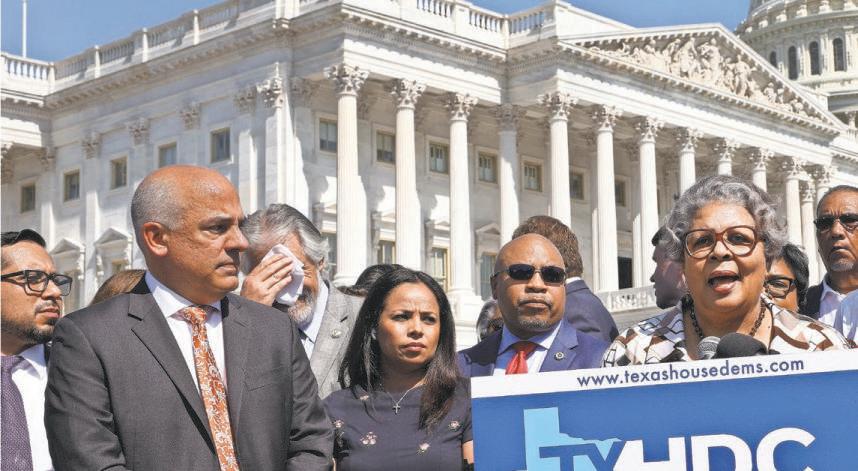
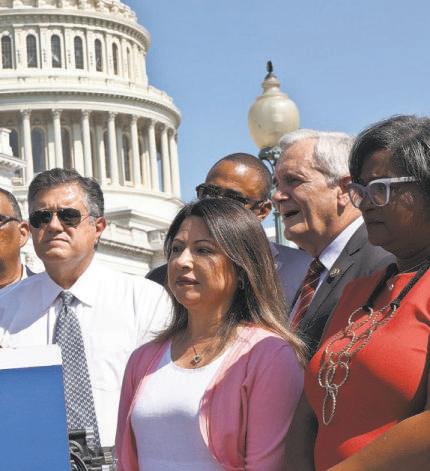
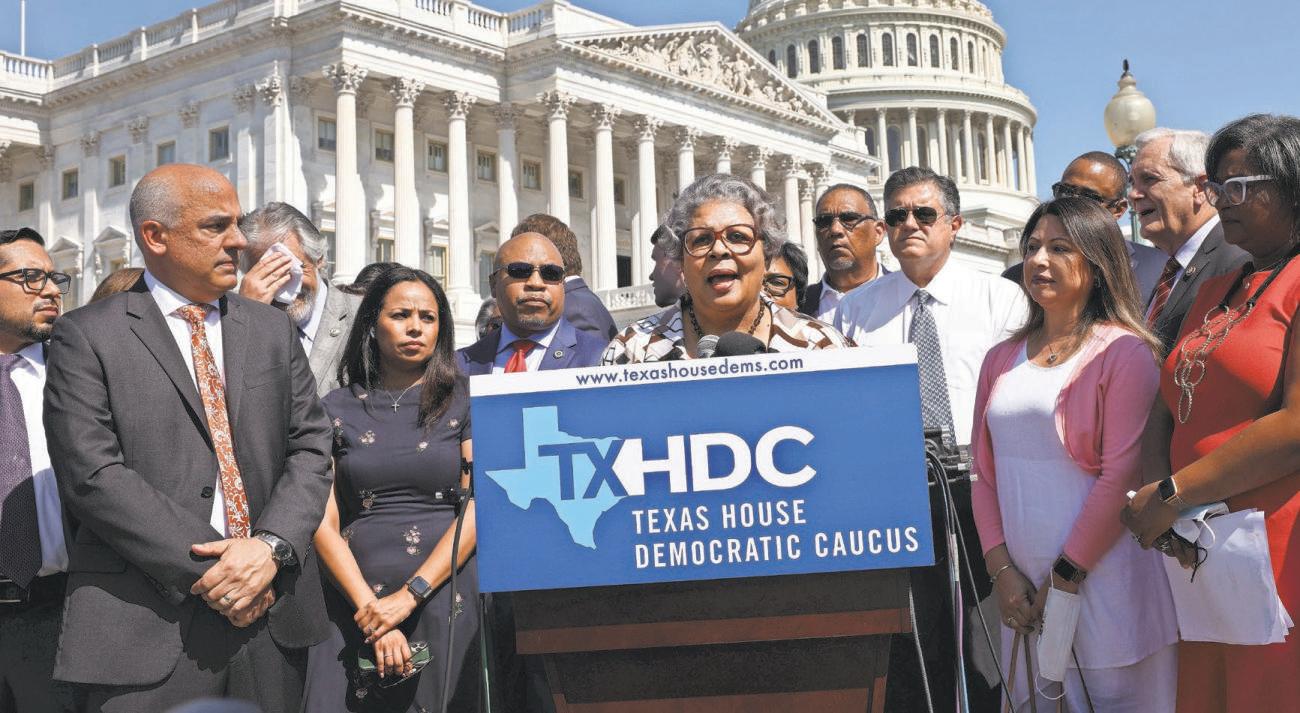










risks, and environmental degradation. Thompson is opposing this (HB 844, HB 852, HB 1823, HB 2883). She has also advocated for obesity and diabetes prevention under Medicaid (HB 2677), PTSD benefits for first responders (HB 673) and insurance for children with “emotional disturbances” (HB 709).
Having worked on the creation of the Mental Health and Brain Research Institute of Texas for over eight years, her legislation (HJR 24, HB 185) would fund research into the impacts of gut health on the brain and mental health conditions like bipolar disorder and schizophrenia. Due to partisan politics,

she could not “carry” her own bill, but she said Lieutenant Governor Dan Patrick took up a portion in the Senate with $3 billion in funding included.
Thompson’s legacy
“I’d like for my legacy to be that I look out for the marginalized individuals, the ‘little dogs’ I call ‘em,” Thompson said. “Marginalized individuals can’t afford a lobbyist. So they send us, people like me. I did my job and I looked out for them…the senior citizens, women and children, and for issues that not only impact society but improve society… I want the Lord to say, ‘Well done.’”
By Laura Onyeneho
When Black Restaurant Week (BRW) frst launched in Houston in 2016, it was a simple yet powerful idea to spotlight Blackowned restaurants and culinary businesses that ofen lacked access to major marketing opportunities.
What started as a local initiative has now exploded into a nationwide movement spanning 17 regions, including major cities like New York, Atlanta, Los Angeles and even Toronto.
As BRW celebrates its 10th anniversary, it’s more than just a week of great food— BRW has helped more than 5,000 Blackowned businesses gain visibility, driving millions of dollars in revenue and economic impact. Black Restaurant Week opened in Houston on March 28 and runs through April 13.
Founded by Houston native Warren Luckett and managed by partners Falayn Ferrell and Derek Robinson, BRW was created to fill a gap. Many Black-owned culinary businesses struggled with limited advertising budgets and lacked the visibility needed to thrive in a competitive industry. With Black-owned restaurants historically facing disproportionate barriers—such as difculty accessing business loans and exclusion from mainstream food festivals—BRW became a lifeline.
Looking back at the early days, Luckett recalls being fully immersed in the wine business with his father, supplying wines to high-end restaurants. However, he noticed a growing trend—black food staples like shrimp and grits and oxtails appeared on menus at upscale “New American” restaurants, ofen without recognizing their cultural roots.
At the same time, social justice issues were coming to the forefront, with incidents like the deaths of Alton Sterling and Philando Castile sparking national conversations about racial inequality.
“As a young Black millennial, I just wanted to do my part,” Luckett says. “Te dinner table was always a safe place for us to have conversations and I hoped food could be a medium to bring the community together while protecting and uplifing the history of Black culinary arts.”
Since its inception, BRW has provided a strategic marketing blitz that ofers participating restaurants and food businesses social media promotions, print and digital advertising and PR exposure—all at a fraction of the traditional cost. Tis model has been crucial, especially in the wake of the COVID-19 pandemic and ongoing economic hardships.
“Tis is God’s work,” Luckett said. “I’m just walking the path. It’s not about me—it’s about the community taking ownership of this brand.”
As BRW marks its 10th anniversary, we take a look back at some of the most defning moments that have shaped this movement:
2016 - The Launch in Houston – What started as a local efort to showcase Black-owned restaurants quickly gained momentum, proving there was a hunger for representation.
2017 - Expansion Begins – BRW took its mission on the road to Atlanta and the Bay Area, setting the stage for national growth. Voted ‘Bright Idea’ by Atlanta Magazine.
2018 - Coast-to-Coast Growth – Cities like Los Angeles, New Orleans, and Philadelphia joined the BRW network, expanding the reach to thousands of new customers.
2019 - Impact Beyond Restaurants
– Partnered with National Urban League to host a campaign in Indianapolis for their national convention
BRW introduced its NOSH events, highlighting Black-owned food trucks, catering businesses, and spirit brands.
2020 - Pandemic Response – As COVID-19 shuttered businesses, BRW launched the Restaurant Business Development Fund to provide fnancial relief.
2021 - Reaching Canada – Toronto became the frst international city to host BRW, reinforcing its global potential.
2022 - Power of Partnership – Major brands and corporate sponsors recognized BRW’s impact, leading to record-breaking restaurant participation.
2023 - Foodie Experience Expands
– BRW launched new food events, from chef showcases to tasting popups, giving food lovers more ways to engage.
2024 - Digital Evolution – BRW introduced an interactive app, making it easier for diners to locate Blackowned businesses year-round.
2025 - A Decade of Excellence – With more than 5,000 businesses supported, BRW looks ahead to even bigger plans for the future.

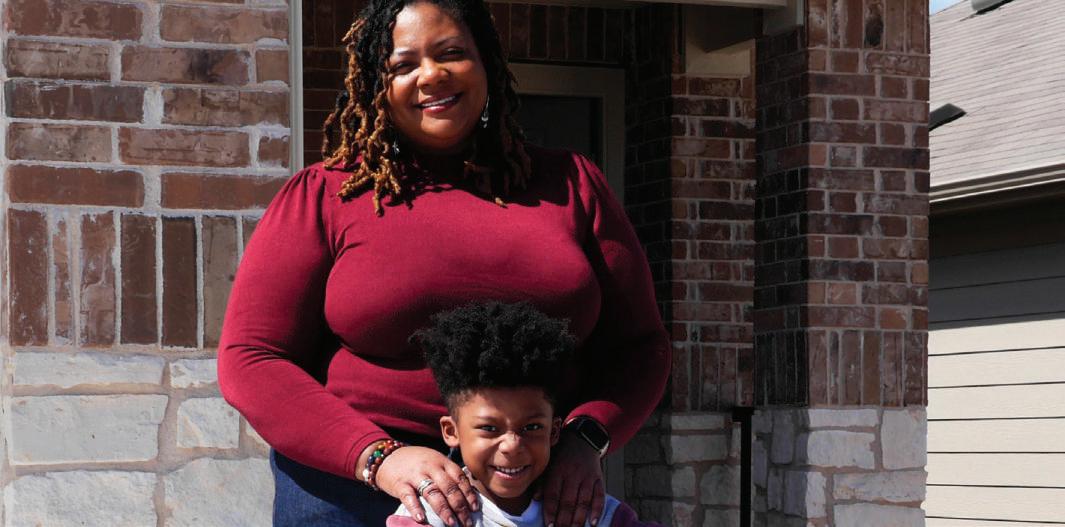




ByLaura Onyeneho
Paul Ezimako never thought he’d be a Republican.
Raised in a mostly Democratic household, he knew where his political loyalties lay—until a college speech assignment changed everything.
In 2018, while researching police brutality against Black Americans, Ezimako expected to find overwhelming data supporting the issue. Instead, the statistics challenged his assumptions.
“I kept trying to frame my argument around police brutality being a huge problem,” he recalled. “But the numbers weren’t saying what I thought they would. I had to rethink everything I believed.”
That moment sent Ezimako down a path of questioning—and, ultimately, political transformation.
His shift was further influenced by conversations with his mother, a Republican.
“Growing up, I was always a Democrat, a liberal. My family is full of Democrats, especially in [my hometown] Chicago. But through a lot of reading and research, I started thinking differently.”
A defining moment came a few years ago when former President Joe Biden gave a speech at Texas Southern University.
“Everybody was so excited to have him on campus, just ecstatic,” he said. However,


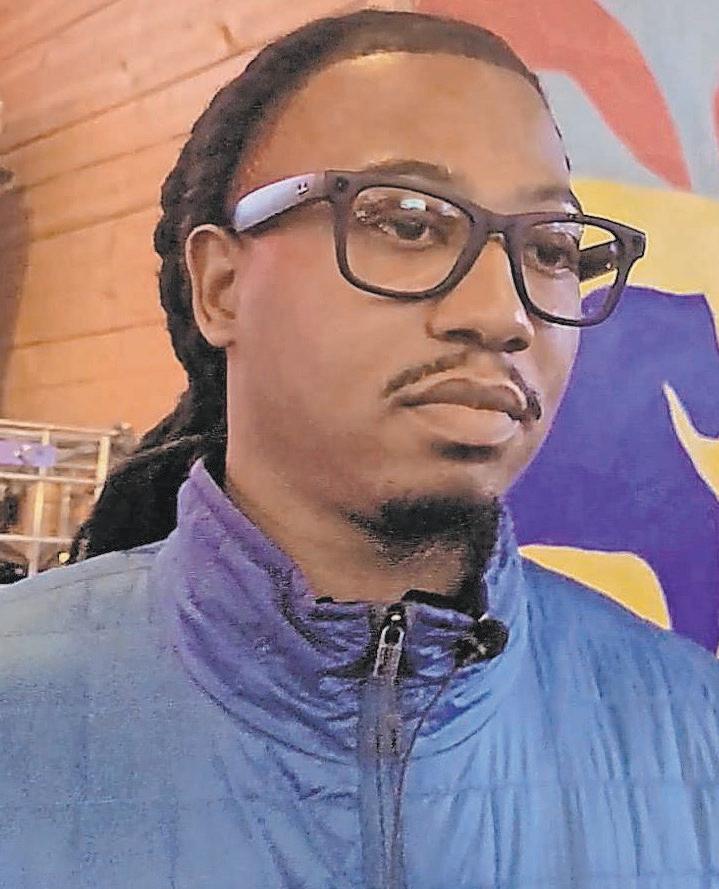
Ezimako noticed his friend, who supported Donald Trump, was met with hostility.
“These are two old white men—why is one so much better than the other? One’s just pandering to you,” Ezimako said. “The other one is being straight up with you. So I think that moment really made me rethink things.”
For decades, Black voters have overwhelmingly supported the Democratic Party, but a growing number of young Black conservatives in Texas are challenging that norm. They argue that the Republican Party better aligns with their values on economics, personal responsibility and government overreach. Yet, they face pushback from both their own community and a party that has historically struggled with Black voter outreach.
In Houston, where the Democratic Party dominates local politics, young Black Republicans say they are often met with skepticism, confusion or outright hostility. Despite this, they remain committed to their beliefs and hope to change the narrative about Black conservatism.
Trump gained a larger share of Black and Latino voters than in 2020, particularly among men under 45, according to AP VoteCast, a nationwide survey of over 120,000 voters. Despite Kamala Harris winning the majority, Trump’s gains prevented her from winning the White House. Voters, including Black and Hispanic voters,






deemed the economy and jobs the most significant issues.
Defying Stereotypes
Lydia Hall, a non-profit accountant, has faced similar struggles. Although she identifies as right of center, she acknowledges the difficulty of being labeled as a Republican in a community where conservatism is often viewed with skepticism.“I’ve always been
fairly independent,” Hall says.

“My parents exposed me to both sides, so I got a good perspective. Unfortunately, when you say you’re conservative, people automatically box you in as a Republican.”
Hall cites free speech and concerns over the Democratic Party’s progressive stance on social issues as key reasons for her political leanings. “I strongly believe in free speech, and I felt like that would have been in jeopardy if



Trump didn’t win,” she said. “The Democratic Party has also become too liberal for my liking, especially with gender ideology and other cultural shifts that I think aren’t good for the country long term.”Hall has lost friendships over her political stance. “It’s hard, but I’ve developed thick skin,” she said. “At the end of the day, your tribe will find you. I’ve met some great people who share my beliefs, and that’s been rewarding.” She pushes back against the

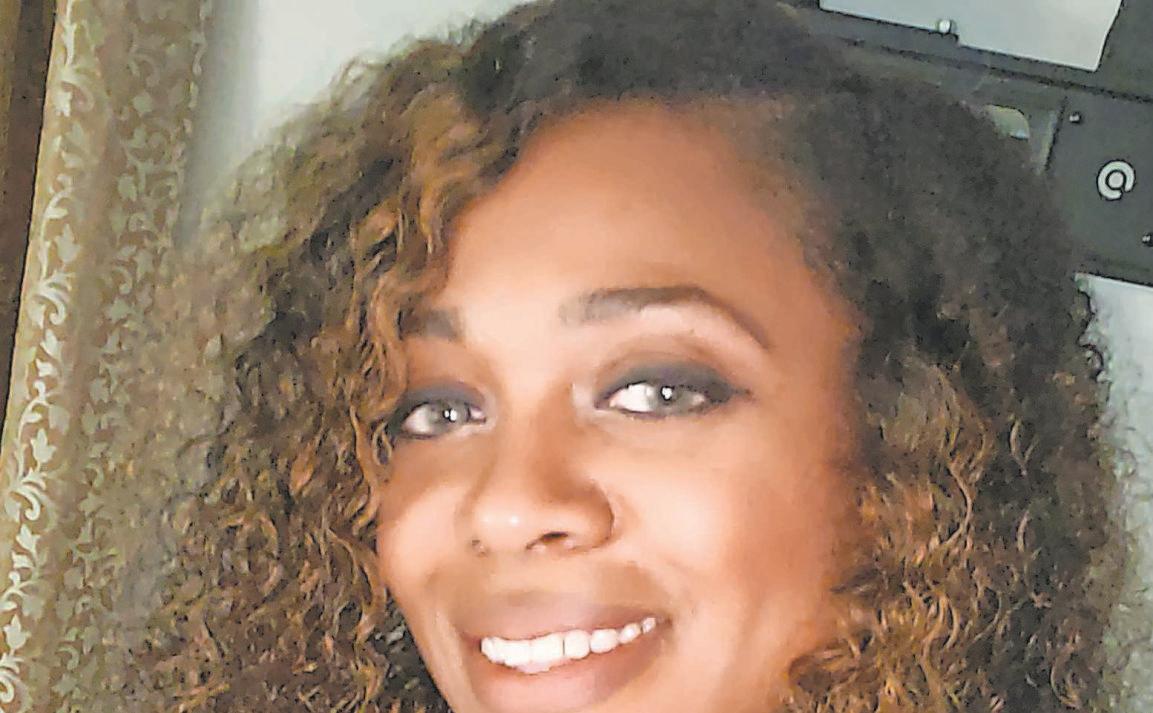

notion that Black conservatives are self-hating or seeking white validation. Hall, in particular, finds it ironic that many of the white conservatives she’s interacted with—often labeled as racist—have been among the most supportive people in her career and personal growth.
“The media portrays conservatives in a way that doesn’t always reflect reality,” she says.
“When you actually meet these people, you realize it’s not what you’ve been told.”
The Republican Party has made some inroads with Black voters. However, conservatives like Alexandria Butler, the Communications Director of the Urban Conservatives of America (UCA), argue that the GOP has room for improvement.
“We’re not as big as organizations like Turning Point USA, but we have boots on the ground working to educate people about conservatism, starting businesses and policy awareness,” she said.
“We help people understand why their neighborhoods, schools and financial situations remain stagnant
while other communities thrive. Once they become aware of these systemic issues, it sparks a fire within them to seek knowledge and take action.”
Butler believes that Democratic policies have negatively impacted Black communities, particularly regarding family structures and economic growth.
“The left encourages a ‘baby daddy, baby mama’ lifestyle to keep abortion mills running and money flowing,” she said. “Once I started researching and aligning my political views with my values, I realized I was a conservative all along.”
She pointed out that the Republican Party was instrumental in electing the
first Black members of Congress and played a crucial role in abolition. However, she noted that these achievements are rarely emphasized in modern political outreach. Butler suggested that Republicans should take advantage of Black History Month to actively promote these milestones through advertisements and public campaigns, rather than being passive about their contributions. Another key issue she addressed was the perception among some Republicans that all Black individuals automatically align with the Democratic Party. She explained that many Black conservatives feel hesitant to discuss
this issue openly for fear of causing division within their ranks.
Butler argued that the party must be willing to have frank discussions about race rather than adopting a colorblind stance that dismisses these concerns outright. She criticized the “racism of low expectations” often present in liberal rhetoric, where Black individuals are assumed to need assistance solely based on their race. Butler says, “Republicans should take a stronger stand against such narratives and to actively create an inclusive environment where race-related issues can be discussed openly without fear.”
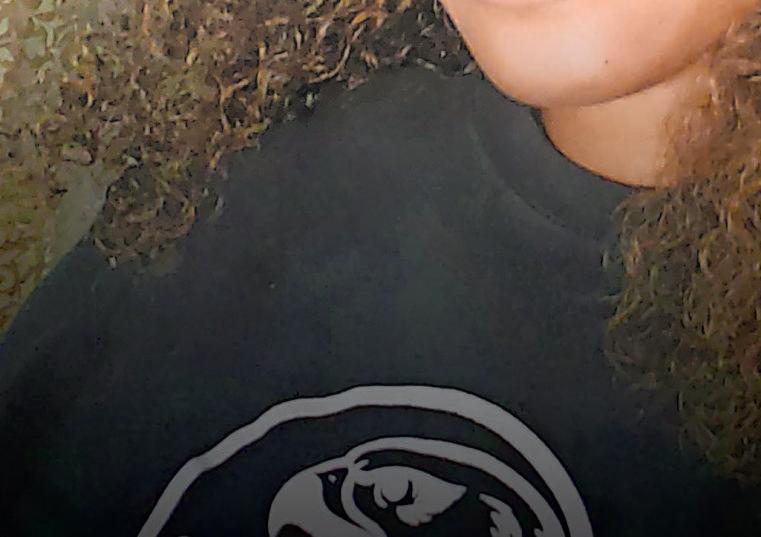



Experiencing backlash.
Javan Evans is the Communications Director for the Houston Young Republicans.
He was raised in a Democratic household in New York, where political discussions often focused on social justice and government support programs. However, his perspective began to shift during college, where he studied finance and developed an interest in entrepreneurship.
“I started questioning why so many of the policies we supported didn’t seem to improve our communities,” he said. “I wanted to find solutions that empowered individuals rather than made them dependent.”
His move to Texas in 2021 was a turning point. The COVID-19 pandemic further cemented his views.
“I saw firsthand how government overreach impacted small businesses and individual freedoms,” he says. “Lockdowns disproportionately hurt Black-owned businesses, and I felt the Democratic leadership wasn’t offering real solutions.”
Diversity, equity and inclusion (DEI) initiatives have also shaped his political identity. “I believe in merit-based opportunities

and that their abilities rather than quotas should judge people,” Evans said. “I understand the intention, but sometimes it feels like these policies create more division than unity.”
Beyond policy issues, Evans says that free speech has been a major concern.
“In many spaces, especially in the Black community, it’s difficult to express conservative views without backlash. But I think it’s important that we have open discussions,” he said.
Evans recalled a time when his peers reminded him of how “whitewashed” he was because his father was white, as well as his friends. He was accused of disregarding his roots, considering his mother is an immigrant from Haiti.
“For all young Black Americans all across this country, just know that if you’re even considering going to a Republican convention or talking to that conservative friend, or you’re just walking down the street, whatever it is, Republicans don’t hate you,” Evans said. “We welcome you with open arms. We welcome your ideas and everything that comes with it. We want to at least have conversations.”
By ERIC NEZERWA, MD
Autism Spectrum Disorder (ASD) affects people from all racial, ethnic, and socioeconomic backgrounds, shaping how they perceive, communicate, and interact with the world. For African American children, diagnosis often comes later than for their peers, delaying access to valuable resources. But by increasing awareness and understanding, families can connect to the support and services that help individuals with autism thrive at every stage of life.
Understanding Autism
Autism is described as a spectrum because it affects individuals differently in how it looks and in its severity. Some people may face significant challenges in communication or daily living, while others excel in areas like memory, creativity, or problem solving. The spectrum also reflects that an individual’s abilities and

Eric Nezerwa, MD, is a board-certified family medicine and primary care physician who cares for patients at Kelsey-Seybold’s South Shore Harbour Clinic.
challenges can evolve over time. This diversity underscores the importance of personalized care tailored to each person’s unique strengths and needs.
Screening and diagnosis for autism typically occur during well-child visits or when developmental differences are noticed. Early diagnosis allows doctors to recommend therapies, educational tools, and other supports customized to a child’s unique journey. For adults, a later diagnosis can provide clarity about lifelong challenges and open pathways to resources that foster independence and well-being.
While every individual is unique, common signs of autism include:
• Delayed speech or language development
• Difficulty making eye contact or engaging socially.


• Repetitive movements or intense focus on specific interests.
• Challenges adapting to changes in routine or environment
If you notice these behaviors in your child or someone you care about, seeking a professional evaluation is an essential first step.
A Brighter Future Through Awareness
Autism is a lifelong condition, but the right support helps individuals achieve milestones and lead fulfilling lives. Early intervention builds vital skills in children, while adults benefit from resources that support personal growth and independence.
Call 713-442-7025 or visit kelsey-seybold.com to schedule a developmental screening or consultation today. Together, we can help every individual reach their full potential.



By Tannistha Sinha
Dr. LaTonya M. Goffney is in her seventh year as the Superintendent of Aldine ISD.
What began as a teaching career in 1999 now has her at the helm of 58,000 students.
Goffney grew up in Coldspring, Texas, where people “did not look like” her, but that is precisely what she loved about her small town.
Goffney is one of the 1.4% Black women superintendents in the country and she believes it’s a hard job, irrespective of race.
“I do recognize that as a Black woman. I try not to point it out often because every district that I’ve been in celebrated the fact that I was their first Black superintendent. I don’t even want to hear about it,” she said. “I want to be the best.”
Goffney’s mother was only 15 when she gave birth to her and did not know who the father was. Growing up in a chaotic household where she was a witness to her mother’s drug use, Goffney credits her for doing the best she could with what she had.
While her childhood was chaotic, her school proved to be a safe haven.
“Perhaps the thing that made the biggest difference for me was my experience at school,” she said. “I had great teachers.”
Her teachers soon realized her talents and placed her in gifted and talented.
“At school, they treated me like I was smart,” Goffney said. “And I never heard that I was smart. At home, it was chaos. At school, there was order.”
In the fifth grade, her life became “unfortunately terrible,” and she moved in with her grandparents, Rebecca and Walter McGowan.


Goffney’s grandfather mowed lawns for a living, and her grandmother cleaned the house for a white family in their locality.
They never studied beyond the fifth grade. Her grandfather, who could not read or write,

always signed his name with an ‘X.’
“And he said, ‘LaTonya, if you can read, you can go anywhere,’” Goffney said. “My grandparents taught me the value of hard work. And perhaps that is the one thing that nobody can take away is hard work.”
Today, she dedicates the “M” in her name to her grandparents, who did not get access to high school or college.
Her lived experiences inspire her to be a figure of support for the students in the schools she leads. In Aldine ISD, a district with 84.5% at-risk, 91.19% economically
Every district that I’ve been in celebrated the fact that I was their frst Black superintendent. I don’t even want to hear about it. I want to be the best.”
DR. LATONYA M. GOFFNEY
disadvantaged, and 47.38% emergent bilingual students, Goffney wants them to understand the power of education. Under her leadership, the district increased overall average daily attendance by 1.3% and reduced chronic absenteeism by 7%.
Goffney’s career
Goffney received the Pell Grant, among others, and attended Sam Houston State University for her bachelor’s, master’s, and doctorate degrees. Her PhD dissertation was on the “Perceptions of Race and Gender in the Superintendency: A Feminist Poststructural Narrative Inquiry of an African American, Hispanic, and White Novice Female Superintendent.”
Goffney taught eighth-grade language arts for three years and then served as an Assistant Principal at Lincoln Junior High for two years. She then went to Coldspring Intermediate School and then returned to Lincoln Junior High as its principal.
She became the Superintendent of Coldspring-Oakhurst ISD in 2008, Lufkin ISD in 2013, and finally, Aldine ISD in 2018.
Currently, Goffney is the President of the National Alliance of Black School Educators (NABSE) and the intermediate past president of the Texas Association of School Administrators. She has also received awards and honors, like the Superintendent of the Year by the Texas Association of School Boards in 2017.
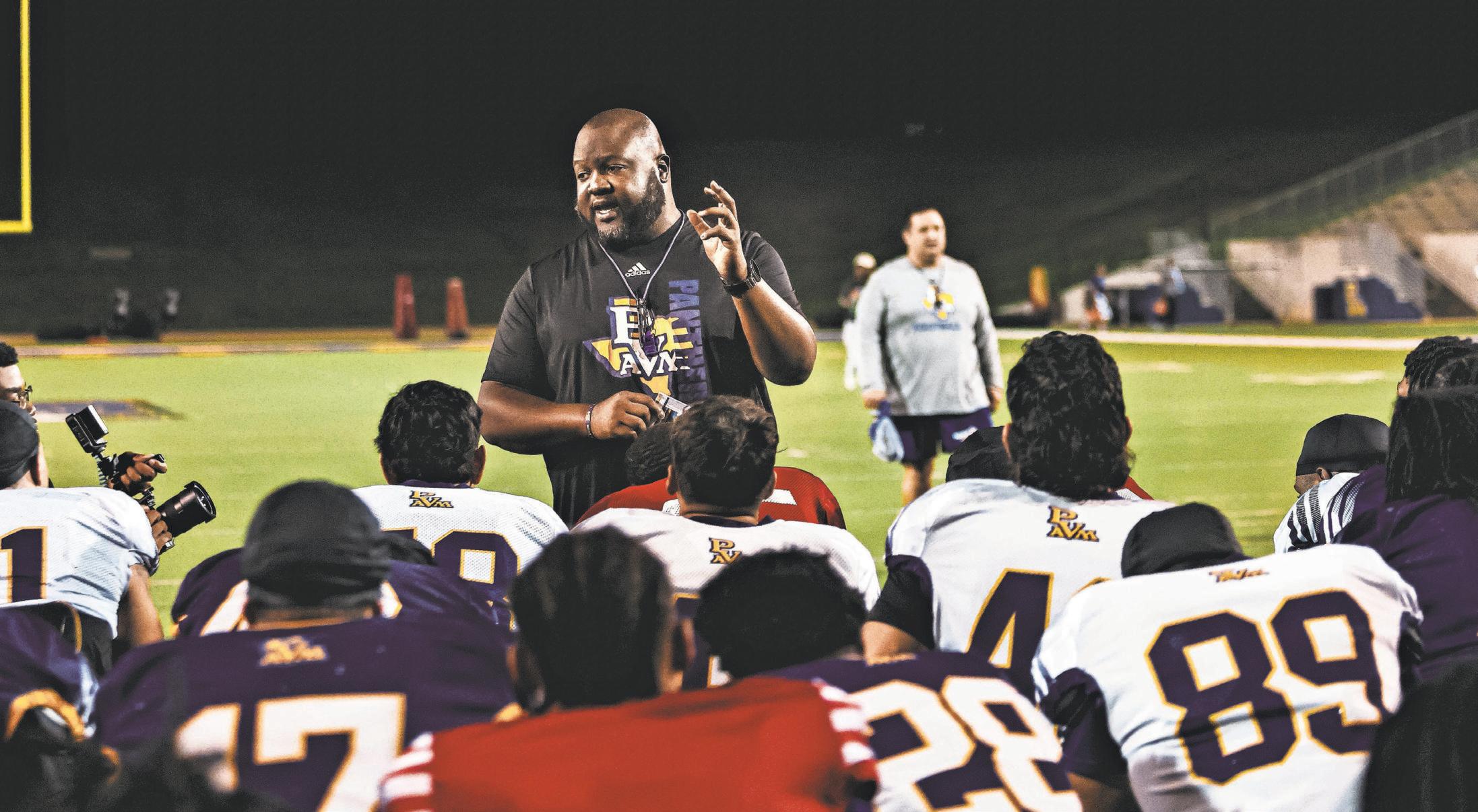
Prairie View coach
Tremaine Jackson (center) has struck a different tone with his players during their spring practices together.
Credit: Prairie View football
By Terrance Harris
New Prairie View Panthers football coach Tremaine Jackson makes no bones about it. He is all about violence on the football feld, and for Jackson, it’s not something you can see, but it’s an energy he can feel and hear.
“Let’s go! Violence!” he demanded of his players.
Jackson says it’s coming. He sees it in fashes, and more importantly, he hears it as the spring ball winds down.
“I’m listening for a certain sound, and that’s the violence that we are talking about,” Jackson said to the Defender. “It’s a violent game, played by violent people, violently and it ain’t no way around that. Te sound is coming.
“Hopefully, by the time we get to the end, it’s sounding like it needs to sound so that I know we are playing violently.”
Welcome to a whole new level of intensity on Te Hill.
Tere is a new voice and sound that starts with the Panthers’ 41-year-old blunt-talking new coach.
Te buy-in has been made by those who choose to stick around afer Bubba McDowell’s contract wasn’t renewed at the end of last season.
“I love it,” said quarterback Lucas Coley, who played at Arkansas and University of Houston before arriving at Prairie View last summer. “Tat’s how I grew up. `You are going to do what I say or you are not going to play. We are not going to get far as a team if you don’t know how to adapt to how I’m teaching the program how to act and behave.’
“He’s been to places, he has won championships. So nothing he is saying is coming from a place of egos. It’s coming from a place of experience. Everybody is buying into that and working day in and day out. It’s awesome. I love it.”
Discipline. Adaptable. Accountability.
Those are the words you hear being thrown around most when it comes to the new Panther way. Being 10 minutes early everywhere is the standard. Being on time is late.
“Te biggest diference is they are holding us accountable,” said defensive tackle Jamal Marshall, who is on his third head coach at Prairie View afer starting out under Eric Dooley before McDowell. “It’s just like the smallest details whether it’s being on time … We have to show up everywhere 10 minutes early. Just little stuf like that. Tat’s been the biggest change I’ve seen so far.”
As much as spring has been about
evaluating talent and introducing the new and old players to the new Panther way, it’s been about getting everybody used to a new set of expectations and doing things around the program. Jackson is coming of leading undefeated powerhouse Valdosta State to the Division II Championship Game, while the Panthers are coming of a 5-7 overall and a 3-5 SWAC fnish.
“We are just in the process of trying to build this culture and the way that we play now,” said Jackson, who played under McDowell when he was a student-athlete at Texas Southern. “We build the way we play now … Everybody talks about what Prairie View football was and what it should be. Tis is the way we establish our culture, the way we do things and we are in the infant stages of it, but it’s going pretty good. Our kids are willing, that’s the biggest deal.”
As expected with any coaching change and given the nature of the transfer portal
and NIL, Prairie View lost a few players, like William Boone, who lef to play for Super Bowl-winning head coach Bill Belichick and the North Carolina Tar Heels. Jackson even lost some players during spring ball.
But Jackson is okay with the defections and excited about the 19 new mid-year transfers who are going through spring practices, including Valdosta State transfers Ty Brown (right guard) and Sterling Roberts (middle linebacker). Jackson anticipates additional additions once the transfer portal opens again this month.
“Everybody didn’t make it with us. Some guys got out of here earlier when we frst got here just because it was too diferent. And that’s okay,” said Jackson, whose plan is to end spring practices on April 17 but the format was still undetermined at the time of this story. “We are just glad to have the guys we are with and we are working to get better and better every day.”
By Jimmie Aggison
Afer a nine-year hiatus, Worthing High School’s baseball team is back in action, thanks to the leadership of new head coach Dante Higgins.
Te Colts have returned to the diamond this season, and while they’re focused on development, the team is already showing signs of growth.
“My goal is to build a competitive team for the future, but for now, I want the players to enjoy the game and learn as much as they can,” said Higgins.
Te lack of youth baseball programs in the area contributed to a decline in player interest over the years, making it difcult for the Colts to feld a varsity team in recent years. Tis decline, combined with the challenge of fnding a committed coach, led to the team’s inactivity starting in 2016.


baseball is the pitcher, and for the Colts, sophomore Boston Greenwood has stepped up as the team’s ace. Greenwood, who hadn’t played since eighth grade, was eager to contribute this season.
“I adjusted by listening to the coaching staf while also having fun and enjoying the game,” said Greenwood. “When I pitch, I focus on hitting certain spots in the strike zone, like the outside edge on a 0-2 count.”
“Greenwood is our leader on the mound,” said Higgins. “He plays hard and stays positive, which helps keep the team focused.”
“For many of our players, this is their frst time playing baseball,” said Higgins. “We’re starting from scratch, teaching them the fundamentals, such as how to properly hold a bat and proper throwing mechanics. Tis year is all about learning and improving week by week.”
Te process of rebuilding the program began last year when Higgins began reaching out to students, encouraging them to join the newly formed team.

eld a varsity team in recent e, combined with the chala committed coach, led to ity starting in 2016. our this is their g baseball,” said om scratch, them s, such as how to oper throwing mechanics. out and k.” f hen nts, rmed team.


Defender.

Inspired by the football team’s recent success, winning the 4A-1 Region III District 11 title for two straight years, the newly formed baseball team aims to generate the same level of excitement.




Worthing Colts catcher, Kameron Guidry provides the perfect target for J’Vonte while on the mound. Credit Jimmie
“We’re making sure the baseball schedule is visible and announcing upcoming games to keep the school informed,” said Higgins. “It’s been great to see students and teachers asking about the game results the day afer. We also wear our baseball gear around campus to let everyone know we’re back.”

J’Vonte Jones, the Colts’ second baseman, was one of the frst players to join the team.

the Colts’ secas one of the oin the team.



St. Louis, Mo., us at
Originally from St. Louis, Mo., Jones had previous baseball experience but had taken a break from the sport. Afer hearing that Worthing was bringing back its baseball team, he jumped at the opportunity.


ound out the school was
“I moved to Worthing in September 2024, and when I found out the school was bringing back the team, I knew I had to be a part of it,” Jones said.
Sophomore catcher Kameron Guidry, another new addition to the team, echoed similar excitement.
“I didn’t know much about the team’s past, but when I heard it was coming back, I felt really good about being part of it,” he said.
Despite not having a practice feld, Higgins kept things fun and engaging with competitive drills.
“The first few practices were tough,
Worthing Colts pitcher, J’Vonte Jones has proven he has what it takes on the mound after joining the Colts. Credit Jimmie Aggison/ Defender.


Tough the team is still in the early stages of its rebuild, the Colts have faced their share of challenges, particularly with skill development and team chemistry. Players recognize the importance of staying composed under pressure.

“One of our challenges is staying calm in tough situations and not overthinking,” said Jones. “We need to be more comfortable with being uncomfortable so we don’t panic.”
Greenwood added, “Owning up to our mistakes instead of blaming others will help us grow as a team. We have to hold each other accountable.”




especially without a feld, but I made sure to keep it fun and keep the players motivated,” said Higgins. “As the team started to come



Despite a 1-6 record so far, Coach Higgins has already accomplished signifcant goals this season. Te team played its frst game in nearly a decade and secured its frst victory in nine years by defeating Jack Yates. Tis win has helped instill belief among the players that they can continue to improve.
together, our focus shifed from just forming a team to preparing to win games.”
One of the most important positions in
“Our main focus right now is showing up to practice, attending games, and applying what we’ve learned,” said Higgins. “As long as we keep putting in the efort, I believe we’ll continue to improve and become more competitive.”
